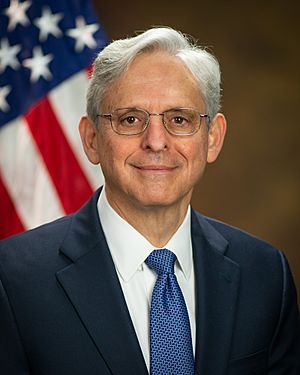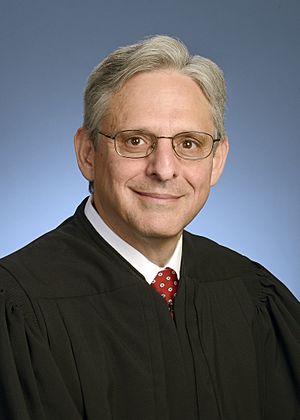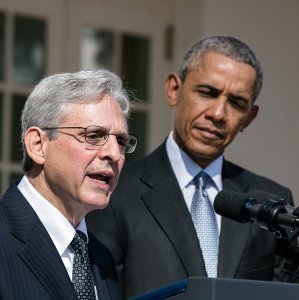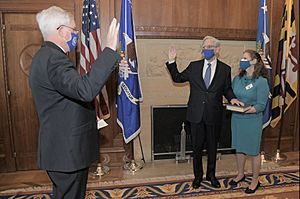Merrick Garland facts for kids
Quick facts for kids
Merrick Garland
|
|
|---|---|

Official portrait, 2021
|
|
| 86th United States Attorney General | |
| In office March 11, 2021 – January 20, 2025 |
|
| President | Joe Biden |
| Deputy | John P. Carlin (acting) Lisa Monaco |
| Preceded by | William Barr |
| Succeeded by | Pam Bondi |
| Chief Judge of the United States Court of Appeals for the District of Columbia Circuit | |
| In office February 12, 2013 – February 11, 2020 |
|
| Preceded by | David B. Sentelle |
| Succeeded by | Sri Srinivasan |
| Judge of the United States Court of Appeals for the District of Columbia Circuit | |
| In office March 20, 1997 – March 11, 2021 |
|
| Appointed by | Bill Clinton |
| Preceded by | Abner Mikva |
| Succeeded by | Ketanji Brown Jackson |
| Personal details | |
| Born |
Merrick Brian Garland
November 13, 1952 Chicago, Illinois, U.S. |
| Political party | Independent |
| Spouse |
Lynn Rosenman
(m. 1987) |
| Children | 2 |
| Education | Harvard University (BA, JD) |
| Awards | Henry J. Friendly Medal (2022) |
| Signature | |
Merrick Brian Garland (born November 13, 1952) is an American lawyer and judge who served as the 86th United States attorney general from 2021 to 2025. Before this, he was a circuit judge on the United States Court of Appeals for the District of Columbia Circuit from 1997 to 2021. In 2016, President Barack Obama nominated Garland to the U.S. Supreme Court. However, the U.S. Senate did not hold a vote to confirm him.
Garland grew up in the Chicago area. He studied at Harvard University and Harvard Law School. He worked as a law clerk for important judges and then as a lawyer. Later, he became a federal prosecutor in the United States Department of Justice. There, he helped oversee the investigation of the Oklahoma City bombers. President Bill Clinton appointed Garland to the U.S. Court of Appeals for the District of Columbia Circuit in 1997. He served as its chief judge from 2013 to 2020.
In March 2016, President Barack Obama nominated Garland to the Supreme Court of the United States. This was to fill a spot after Justice Antonin Scalia passed away. However, the Republican majority in the Senate refused to hold a hearing or vote on his nomination. This decision was very unusual. Garland's nomination lasted 293 days, which was the longest ever for a Supreme Court nominee. His nomination ended on January 3, 2017. Later, President Donald Trump nominated Neil Gorsuch for the seat, and the Senate confirmed him.
President Joe Biden nominated Garland as U.S. Attorney General in January 2021. The Senate confirmed him with a 70–30 vote, and he took office in March of that year. During his time as Attorney General, Garland faced some criticism. This included comments about the speed of investigations related to former President Donald Trump.
Contents
Early Life and Education
Merrick Garland was born on November 13, 1952, in Chicago. His mother, Shirley, was a director of volunteer services for an organization helping older people. His father, Cyril, ran a small advertising business from their home. Garland was raised in a Conservative Judaism family. His grandparents came to the U.S. in the early 1900s, escaping persecution in Eastern Europe. Two of his grandmother's siblings were later killed in the Holocaust.
Garland grew up in Lincolnwood, a suburb of Chicago. He attended Niles West High School in Skokie, Illinois. There, he was president of the student council and a member of the debate team. He graduated in 1970 as the top student in his class. He was also recognized as a Presidential Scholar.
He then studied social studies at Harvard University. He first thought about becoming a doctor but soon decided to become a lawyer. During his college summers, Garland volunteered as a speechwriter for Congressman Abner J. Mikva. Garland graduated from Harvard in 1974 with high honors.
Garland then went to Harvard Law School. He was a member of the Harvard Law Review, a student-run legal journal. He graduated from Harvard Law School in 1977 with high honors.
Starting His Legal Career
After law school, Garland worked for two years as a law clerk for judges. First, he worked for Judge Henry Friendly in New York City from 1977 to 1978. Then, he worked for Justice William J. Brennan Jr. at the U.S. Supreme Court from 1978 to 1979. After these clerkships, Garland spent two years as a special assistant to U.S. Attorney General Benjamin Civiletti.
In 1981, Garland joined a private law firm called Arnold & Porter. He mostly worked on corporate lawsuits and became a partner in 1985. From 1985 to 1986, he also taught antitrust law at Harvard Law School.
In 1989, Garland decided to return to public service. He became an assistant United States attorney in Washington, D.C.
Garland briefly returned to Arnold & Porter from 1992 to 1993. In 1993, he joined the Clinton administration. He worked in the Criminal Division of the United States Department of Justice. The next year, he became a top assistant to Deputy Attorney General Jamie Gorelick.
In this role, Garland helped oversee major domestic terrorism cases. These included the Oklahoma City bombing, the case of Ted Kaczynski (the "Unabomber"), and the Atlanta Olympics bombings. Garland went to Oklahoma City after the attack to oversee the investigation. He helped pick the legal team and supervised them from Washington, D.C. He was involved in important decisions, like seeking the death penalty for the bombers. Republican Governor Frank Keating of Oklahoma praised Garland's work on the case.
Federal Judge Service (1997–2021)
Becoming a Judge

On September 6, 1995, President Bill Clinton nominated Garland to the U.S. Court of Appeals for the District of Columbia. This was the seat left by his mentor, Abner J. Mikva. Justice Brennan, for whom Garland had worked, recommended him for the position. The American Bar Association (ABA) gave Garland its highest rating, "well-qualified."
Garland had a hearing before the Senate Judiciary Committee on December 1, 1995. He said he admired Supreme Court Justice Brennan and Chief Justice John Marshall. However, Senate Republicans did not schedule a vote on his confirmation. This was due to a disagreement about whether to fill the seat at all.
After winning the 1996 presidential election, Clinton nominated Garland again on January 7, 1997. The Senate confirmed him on March 19, 1997, by a vote of 76–23. Most Republican senators voted to confirm him. He officially became a judge on March 20, 1997.
Leading the D.C. Circuit Court
Garland became the chief judge of the D.C. Circuit Court on February 12, 2013. In May 2013, he announced that the court would provide same-day audio recordings of arguments to the public. He was active in the Judicial Conference of the United States. His seven-year term as chief judge ended on February 11, 2020. Judge Sri Srinivasan took over from him. Garland continued to serve as an active judge until he retired.
Key Decisions as a Judge
Garland is seen as a moderate judge. He has been described as a "moderate liberal" who often supported prosecutors in criminal cases. Legal experts say his decisions are usually neutral and avoid big, sweeping statements. He is known for working well with other judges, and his opinions rarely lead to disagreements.
Protecting Whistleblowers
Garland has supported laws that protect whistleblowers. These are people who report wrongdoing, especially when it involves fraud against the government. For example, in a 1998 case, Garland ruled that a person fired for reporting fraud could sue under the False Claims Act. In another case in 2004, Garland disagreed with a court decision that limited the False Claims Act. His disagreement helped lead to a new law in 2009 that closed this loophole.
National Security Cases
During his time as a judge, the D.C. Circuit reviewed cases from the Guantanamo Bay detention camp. In 2011, Garland wrote a decision that rejected a petition from a Guantanamo detainee. In 2008, he wrote a decision that overturned a finding that a captured Uyghur person was an enemy combatant. In 2009, Garland disagreed with a court decision that prevented former Iraqi detainees from suing private companies involved in abuse at Abu Ghraib prison. He believed the lawsuit should be allowed.
First Amendment Rights
Garland has generally supported a broader view of First Amendment rights, which protect freedom of speech and the press. In cases about government transparency, his decisions favored open government. For example, in 2013, he ruled that the CIA had to process a request for information about drone strikes.
In 2005, Garland disagreed when the court upheld holding reporters in contempt for not revealing their anonymous sources. He wrote that the decision "undermined the Founders' intention to protect the press." In another 2005 case, Garland ruled that a U.S. Postal Service rule banning petition signatures at post offices violated the First Amendment.
Second Amendment
In 2007, Garland voted to review a decision that struck down the D.C. handgun ban. The Supreme Court later upheld this decision.
Retirement from Judicial Service
Garland retired from his federal judicial role on March 11, 2021. He did this to accept his appointment as the Attorney General of the United States.
Supreme Court Nomination Attempts
Garland was considered for a spot on the Supreme Court twice before his 2016 nomination.
Considerations in 2009 and 2010
In 2009, after Justice David Souter announced his retirement, Garland was one of nine finalists for the position. The spot eventually went to Sonia Sotomayor.
In 2010, after Justice John Paul Stevens announced his retirement, Garland was again a top candidate. President Obama interviewed him for the vacancy. Senator Orrin Hatch, a Republican, said he would support Garland if he were nominated. However, Obama nominated Solicitor General of the United States Elena Kagan, who was confirmed.
2016 Nomination and Senate Refusal

On February 13, 2016, Supreme Court Justice Antonin Scalia passed away. Soon after, Senate Republicans, led by Majority Leader Mitch McConnell, stated they would not consider any nominee from President Obama. They believed the next president should fill the vacancy. President Obama said he would fulfill his duty to appoint a judge.
In March 2016, news reports said Garland was being considered by the Obama administration. A week later, he was named one of the top three candidates. On March 16, Obama officially nominated Garland to the Supreme Court.
Garland had more federal judicial experience than any other Supreme Court nominee in history. The American Bar Association gave him its highest rating, "well-qualified."
However, under Senate Majority Leader Mitch McConnell, the Republican majority in the Senate refused to consider Garland's nomination. They held "no hearings, no votes, no action whatsoever." This refusal was seen by many as unprecedented.
After 293 days, Garland's nomination expired on January 3, 2017. This was the longest a Supreme Court nomination had ever been pending. On January 31, 2017, President Donald Trump nominated Neil Gorsuch to fill the vacancy. The Senate confirmed Gorsuch on April 7, 2017.
McConnell later said that stopping Garland's nomination was "the most consequential decision I've made in my entire public career."
Attorney General of the United States (2021–2025)
Nomination and Confirmation
President-elect Joe Biden chose Garland for the position of United States attorney general. The news came on January 6, 2021. Biden formally nominated him on January 20, after becoming president. In his confirmation hearings, Garland promised to oversee strong investigations of those who participated in the 2021 storming of the United States Capitol. He drew on his experience prosecuting the Oklahoma City bombing perpetrators.
Garland also said the Biden administration would likely pause the use of the federal death penalty. He expressed concerns about its fairness. He pledged to protect equal justice under law and strengthen the Justice Department's Civil Rights Division. Garland promised that the Justice Department would remain independent under his leadership. The Senate confirmed Garland's nomination on March 10, 2021, by a vote of 70–30. He was sworn in on March 11, 2021.
Time as Attorney General
In April 2021, Russia placed sanctions on Garland, preventing him from entering the country. This was in response to U.S. actions against Russia.
In July 2021, Garland put a pause on all federal executions. This was to allow a review of policies and procedures. This decision was in line with President Biden's promise to work towards ending the federal death penalty.
Protecting Voting Rights

In June 2021, Garland promised to double the Justice Department's staff focused on protecting the right to vote. This was in response to efforts by some to restrict voting. That same month, Garland announced a lawsuit against Georgia. The lawsuit argued that Georgia's new voting restrictions unfairly targeted Black Americans.
In July 2021, the Justice Department issued guidelines about election law changes. They reminded states to follow federal election and civil rights laws. In November 2021, the Justice Department sued Texas over a new law. They argued it would restrict voting for people with limited English skills and soldiers overseas.
In December 2021, the Justice Department sued Texas again. They claimed Texas's new voting district maps discriminated against Latino and Black voters.
Civil Rights Focus
During Garland's time as Attorney General, the Justice Department focused on protecting civil rights. Garland reversed a previous policy that limited investigations into police misconduct. He also allowed the use of consent decrees to help reform police departments.

In June 2021, the Justice Department changed a policy that banned federal officers from using body-worn cameras. The new policy made body cameras mandatory for federal law enforcement in certain situations. In September 2021, the Justice Department limited the use of chokeholds and carotid restraints by federal officers. They also limited "no-knock" entries when executing warrants.
January 6 U.S. Capitol Attack Investigations

On July 26, 2021, the Justice Department allowed former Trump administration officials to testify about the 2021 United States Capitol attack. They said these officials were free to provide "unrestricted testimony."
In November 2022, Garland appointed Jack Smith as a special counsel. Smith was appointed to oversee investigations related to former President Donald Trump.
Robert Hur Report on Classified Documents
On February 8, 2024, the Justice Department released a report by special counsel Robert Hur. The report looked into President Biden's handling of classified documents. It concluded that charges were not needed. The report mentioned concerns about Biden's memory. Garland stated that Hur's investigative steps were appropriate.
Personal Life
Garland and his wife, Lynn, married in September 1987. Lynn's grandfather, Samuel Irving Rosenman, was a judge and advisor to presidents. Lynn graduated from Harvard University and has a Master of Science degree. She advises groups on voting system security. The couple lives in Bethesda, Maryland.
Garland and his wife have two daughters, Rebecca and Jessica. Both graduated from Yale University. Jessica Garland worked as a law clerk for Justice Elena Kagan. However, she did not serve as a clerk while her father was Attorney General to avoid any appearance of conflict of interest.
Financial reports in 2016 showed Garland's net worth was between $6 million and $23 million. As of 2021, it was estimated between $8.6 million and $33 million.
Garland is red-green colorblind. He is a Reform Jew.
See also
 In Spanish: Merrick Garland para niños
In Spanish: Merrick Garland para niños
- List of nominations to the Supreme Court of the United States
- List of Jewish American jurists
- List of Jewish United States Cabinet members
 | Georgia Louise Harris Brown |
 | Julian Abele |
 | Norma Merrick Sklarek |
 | William Sidney Pittman |


